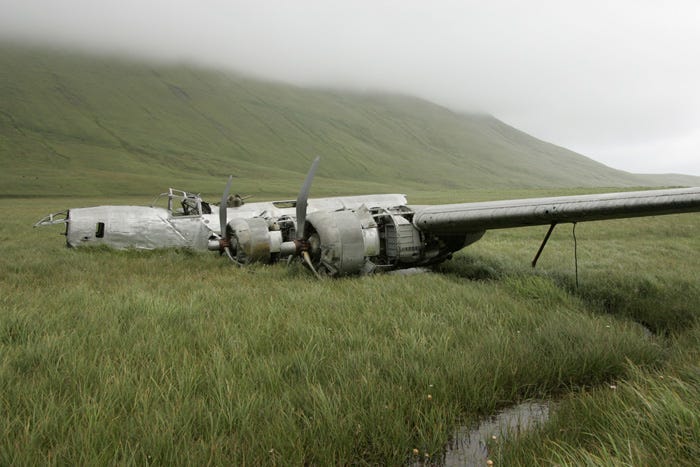I had a re-enlistment bonus of $10,000 sitting right in front of me. All I had to do is commit to another three years and the money was mine to do as I wished.
But like so many things in life, there were conditions. The first year: commit to a one-year assignment at the Coast Guard LORAN Station on Attu Island. If you are not familiar with Attu Island, it is the very last island in the Aleutian Island chain. Located in the middle of the Bering Sea, I would have to spend a year with a bunch of Coast Guard electronic technicians who maintained and operated the LORAN Station as it sent out navigational signals to ships in the North Pacific Ocean. During World War II, Attu Island was one of two islands that were occupied by the Japanese Army. One of my buddies at the station, who had actually visited the island while his ship was on patrol in the Bering Sea, said that Attu Island was the most dismal, lonely place on the planet. The natives that lived on the island were taken prisoner and removed from the island. There are no roads or towns on Attu. Just a landing strip, a boat dock, and mostly undisturbed relics of the battle that was fought there.



Attu might have been out in the middle of the Bering Sea, but I was very intrigued about the assignment. In fact, the opportunity to spend a year in the middle of nowhere posed a certain amount of fascination. In my opinion, the Coast Guard was offering me an incredible opportunity. As an introvert, the thought of spending a year on an uninhabited island where I could cook, read, and write was very tempting.
While the assignment of being the cook on Attu Island was tempting, I had serious doubts that the recruiting officer could station me wherever I wanted for the last two years of my extension. Also, after four years, I was ready to be a civilian again. My parents in Iowa who were getting older and definitely could use my help around the house. And perhaps the largest reason for me to leave the Coast Guard was that I wanted to be a culinary student at Kirkwood. I was pleased to discover that my G.I. Bill benefits would cover the tuition costs. My parents agreed that I could live at home while I went to school.
So at the conclusion of my Coast Guard enlistment, I moved from Rockland, Maine back home to Winthrop, Iowa. Three months later, I began my training as culinary student at Kirkwood Community College in Cedar Rapids.
The idea of attending culinary school was extremely exciting for me. I can still remember waking up for the first day of class and putting on a brand new, unstained chef coat, checkered pants, and adjusting my chef toque. I felt like a million bucks.
Walking into the kitchen on the first day of class, I felt like Dorothy in “The Wizard Of Oz” at the moment that she opens the front door of her house stepping out of her black and white monochrome world, and entering into the fantastical technicolor world of Oz. I jumped head first into dedicating myself to learn as much as I possibly could about all things edible.
That first day, I met Chef Dave Dettman, the main culinary instructor at Kirkwood. He introduced himself and gave our class a 20-minute demo on making crepes. Using four small saute pans, he showed how he was able to coordinate making 4 crepes at a time. Armed with a bowl of crepe batter, a small ladle, and a rubber spatula, I watched Chef Dave’s motions of ladling a small amount of batter into each pan, and then tilting the pans to spread the batter, flipping the crepes, loosening the crepes from the pan if needed with the rubber spatula, and sliding the finished crepes onto a sheet tray.
While I was watching Chef Dave, any second thoughts that I might have had about staying in the Coast Guard dissipated. I realized that I was exactly where I needed to be.
There was something about Chef Dave that really impressed me. By the end of that first day in class, I had decided that not only was Chef Dave going to be my culinary instructor, but that I needed him to be my mentor as well. I decided to do whatever I needed to do to work as closely with him as possible. As a culinary student, I was determined to look under every stone, turn over every leaf, and learn as much as I possibly about food and the process of cooking. And Chef Dave was the person who was going to teach it to me.
There was one hang up about making Chef Dave my mentor though: how to get Chef Dave’s undivided attention. There were 12-15 students for our culinary lab sessions, and with every student preparing a different recipe, the culinary lab was usually very busy. It was soon apparent that Chef Dave had to be like a rubber band, attending to one student’s questions and needs only to have a student across the room call out in need for him. Chef Dave was also teaching the second-year students as they prepared their meals for “The Class Act”, a small restaurant the second year students ran. I soon realized that getting Chef Dave’s attention during class was going to be challenging.
But after about two days in class, a couple of things soon became evident. The first was that at least part of the students weren’t as serious about their culinary education, and somewhat passive about their culinary training. Coming into the program with 2 1/2 years of solid cooking experience, and a solid foundation of basic culinary fundamentals, I jumped into culinary school totally engaged, determined to make the most out of every moment of every class. Chef Dave picked up on my curiosity and soon realized that I was serious about my education.
The other way that I developed my relationship with Chef Dave was to either show up before class or stay after class. Many mornings I would show up at least an hour before class and help Dave with any preparations that needed to be taken care of for that day’s class. In the afternoons after class, I stuck around to help with any extra cleaning up or organization that might be needed. It was during these times that I could have more in-depth conversations about cooking.
If Chef Dave needed a volunteer for anything, I immediately raised my hand. In addition to our scheduled time of being in culinary lab, the culinary students hosted and served a number of Pre Fixe Dinners, selling tickets to the public. These dinners were great showcase events to show our family and friends what we were learning. Each student was assigned to work two dinners a semester. Being so enthusiastic, I joyously volunteered to help with every dinner. Typically these dinners were ethnically themed, I was able to help prepare French, German, Norwegian, Italian, Japanese, Mexican, and American dishes
during themed dinners. During my second year in the program, I was asked to be the student executive chef at a Caribbean dinner. Typically the Pre Fixe Dinners included five courses. Being so overly ambitious, I convinced the other students and Chef Dave that we should serve a seven-course meal. It’s just two extra courses right? Somehow everyone went along with the idea and our group pulled the dinner off like seasoned pros.
At the end of my first semester, Chef Dave asked me if I wanted to be a part of the Kirkwood culinary competition team. Enthusiastically, I agreed, knowing that it was yet another opportunity to extract even more culinary knowledge from Chef Dave.
Looking back, my time as a culinary student at Kirkwood Community College definitely felt like stepping into a technicolor culinary land of Oz. But while Dorothy just walked one yellow brick road, I found an infinite number of gastronomic yellow brick roads to explore. And with each road, my mentor was there every step of the way.
Thank you, Chef Dave. You are the greatest mentor that I could ever have.








